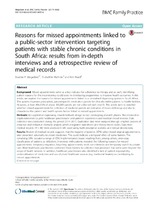| dc.contributor.author | Magadzire, Bvudzai P. | |
| dc.contributor.author | Mathole, Thubelihle | |
| dc.contributor.author | Ward, Kim | |
| dc.date.accessioned | 2017-08-31T09:32:08Z | |
| dc.date.available | 2017-08-31T09:32:08Z | |
| dc.date.issued | 2017 | |
| dc.identifier.citation | Magadzire et al. (2017). Reasons for missed appointments linked to a public-sector intervention targeting patients with stable chronic conditions in South Africa: results from in-depth interviews and a retrospective review of medical records. BMC Family Practice, 18:82 | en_US |
| dc.identifier.issn | 1471-2296 | |
| dc.identifier.uri | https://doi.org/10.1186/s12875-017-0655-8 | |
| dc.identifier.uri | http://hdl.handle.net/10566/3161 | |
| dc.description.abstract | BACKGROUND
Missed appointments serve as a key indicator for adherence to therapy and as such, identifying patient reasons for this inconsistency could assist in developing programmes to improve health outcomes. In this article, we explore the reasons for missed appointments linked to a centralised dispensing system in South Africa. This system dispenses pre-packed, patient-specific medication parcels for clinically stable patients to health facilities. However, at least 8%–12% of about 300,000 parcels are not collected each month. This article aims to establish whether missed appointments for collection of medicine parcels are indicative of loss-to-follow-up and also to characterise the patient and health system factors linked to missed appointments.
METHODS
We applied an exploratory mixed-methods design in two overlapping research phases. This involved in-depth interviews to yield healthcare practitioners’ and patients’ experiences and medical record reviews. Data collection was conducted during the period 2014–2015. Qualitative data were analysed through a hybrid process of inductive and deductive thematic analysis which integrated data-driven and theory-driven codes. Data from medical records (N = 89) were analysed in MS excel using both descriptive statistics and textual descriptions.
RESULTS
Review of medical records suggests that the majority of patients (67%) who missed original appointments later presented voluntarily to obtain medicines. This could indicate a temporal effect of some barriers. The remaining 33% revealed a range of CDU implementation issues resulting from, among others, erroneous classification of patients as defaulters. Interviews with patients revealed the following reasons for missed appointments: temporary migration, forgetting appointments, work commitments and temporary switch to private care. Most healthcare practitioners confirmed these barriers to collection but perceived that some were beyond the scope of health services. In addition, healthcare practitioners also identified a lack of patient responsibility, under-utilisation of medicines and use of plural healthcare sources (e.g. traditional healers) as contributing to missed appointments.
COCLUSION
We suggest developing a patient care model reflecting the local context, attention to improving CDU’s implementation processes and strengthening information systems in order to improve patient monitoring. This model presents lessons for other low-and-middle income countries with increasing need for dispensing of medicines for chronic illnesses. | en_US |
| dc.language.iso | en | en_US |
| dc.publisher | BioMed Central | en_US |
| dc.subject | Public-sector | en_US |
| dc.subject | Western Cape | en_US |
| dc.subject | South Africa | en_US |
| dc.subject | Stable chronic conditions | en_US |
| dc.subject | Non-communicable diseases | en_US |
| dc.subject | Access to medicines | en_US |
| dc.subject | Missed medical appointments | en_US |
| dc.title | Reasons for missed appointments linked to a public-sector intervention targeting patients with stable chronic conditions in South Africa: results from in-depth interviews and a retrospective review of medical records | en_US |
| dc.type | Article | en_US |

